Theodoric Chew Has His Sights Set on a Metaverse for Mental Health
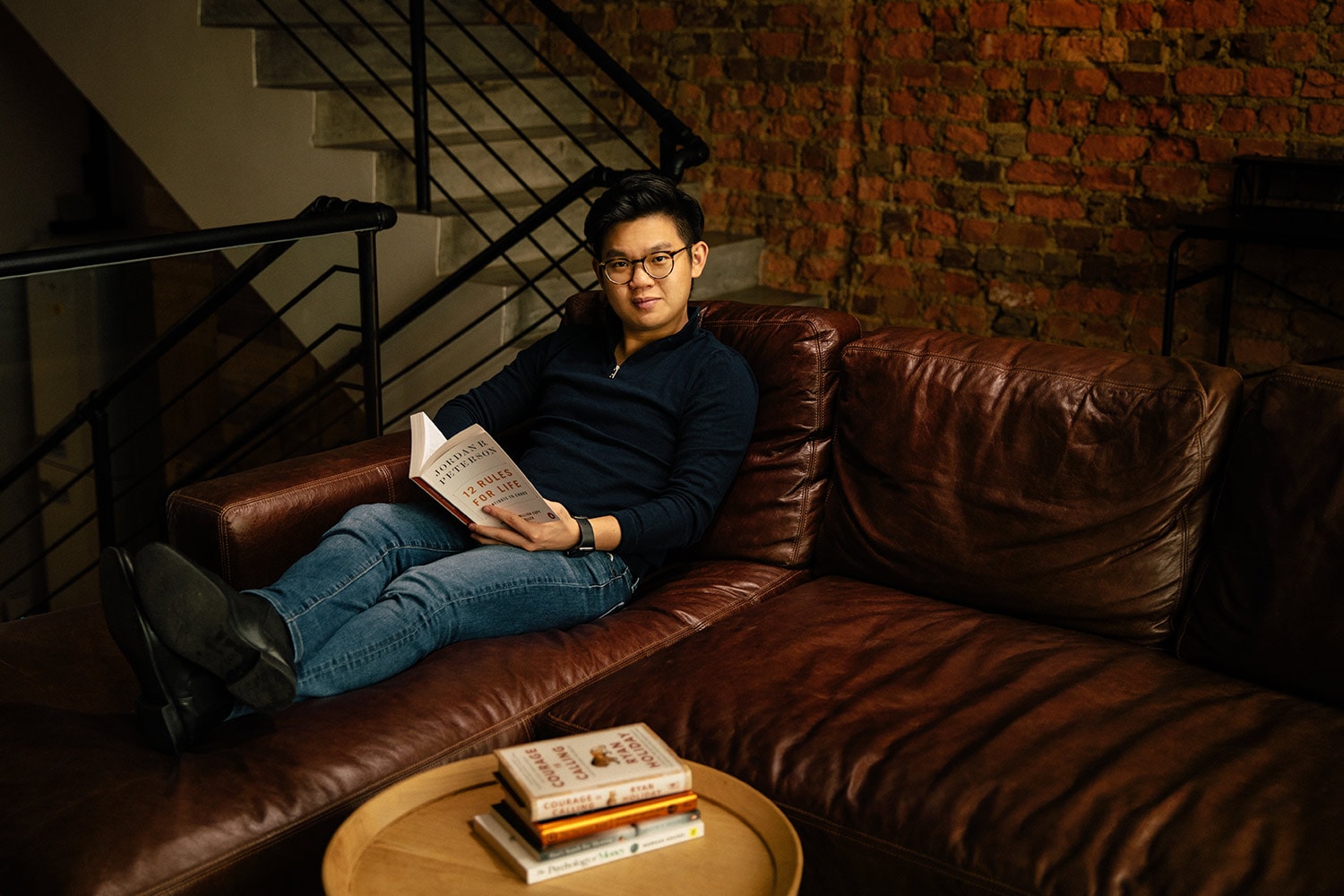
Theodoric Chew is quite the modern-day Renaissance man. At 26, the bespectacled entrepreneur has already dabbled in everything from gym equipment to apparel, led the marketing team at Tokyo-based travel start-up Voyagin and even created a content platform called Existgreat (which he sold in 2016). His current venture may be his most ambitious yet—aimed at making a dent in the perceived stigma towards mental health and providing support in an accessible or preventative way. Theodoric, who suffers from near-constant anxiety, first created Intellect in 2019, out of a personal need. But knowing that there are many degrees of mental health and how people move on a continuum ranging from good health to so-so to poor to illness, he quickly ramped up the app—offering personalised end-to-end care with health coaches, trained psychologists and self-guided programmes to serve individuals and companies. “We are an end-to-end platform: whether you wake up feeling lousy, or are dealing with a full-blown crisis,” he says. “Many apps are fragmented and don't connect you to the next step, but we have the most immersive form of support.” Early this year, Intellect raised US$10 million in Series A funding and with this new injection of capital, Theodoric intends to not only create a mental healthcare system in Asia that is up to snuff, but also build out a metaverse. Whether Theodoric will pull it off, time will tell. But going by his track record, the odds are in his favour.
DAWN WONG: What are your thoughts on serial entrepreneurship as the ultimate type of entrepreneurship and social proof denoting success?
THEODORIC CHEW: The meaning of that has changed over the years. It was sexy at first! Back then, I was just trying to do something that had a great impact and scale. I had an inner thirst for building something fulfilling, like how do we build something that could change the world? I’m always looking for the next thing. Some people have one good push and that’s it. There is a lot of stress and pressure involved in entrepreneurship. After one good run, they may not want to be an entrepreneur anymore. But I think if you have done something that has seen fruition, you will want to continue.
DAWN: What is your definition of success then?
THEODORIC: Not to sound cliche, but the monetary aspect is definitely part of it and the ability to live comfortably. Success also means building something that goes beyond me—impacting people’s lives for the better in years to come. At Intellect, we are trying to create a metaverse of mental health in Asia. If we get this right, it could be a game-changer.
DAWN: Do you have anyone that you look up to in the start-up scene?
THEODORIC: I look up a lot of the early batch of Singapore founders, like Anthony Tan of Grab. I admire the way they found the resources to build something from nothing. There were barely any mentors to follow and no blueprint for start-ups. Another person I admire is my older brother who runs a financial trading business and an education business.
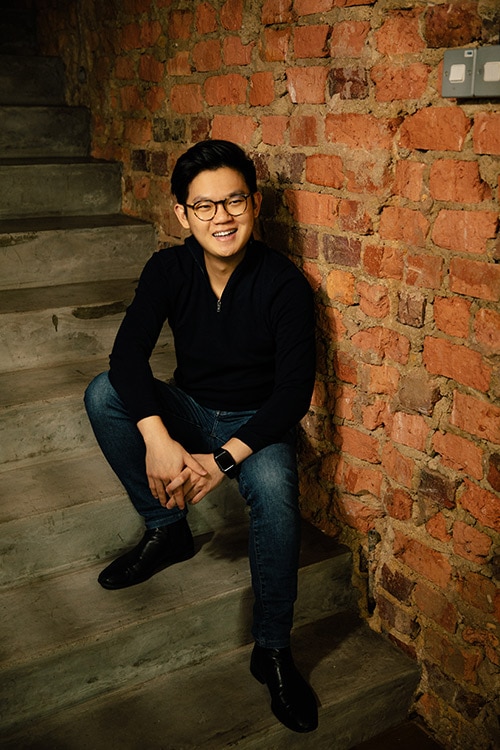
DAWN: Did you have any personal mentors to guide you on your journey?
THEODORIC: Over the years, I learnt a lot from the people I have worked with like the founders of Carousell and Shopback. They were successful in building the next generation of start-ups and created a blueprint for local companies to follow if they wanted to become big around the region. At the same time, I observed the missteps they took and made a mental note not to repeat them.
"People underestimate what they can do in five years but overestimate what they can do in a year."
DAWN: Speaking of learning, when you were running Existgreat, you interviewed several high-profile technopreneurs such as Gary Vaynerchuk and Rand Fishkin. Did you glean any insights from them?
THEODORIC: What resonated with me was when Gary said that “entrepreneurs have to be impatient in the short term but patient in the long term.” That means work hard at present, but think about how to make that last for the next two to five years. Many young entrepreneurs do something for three to six months, but fizzle out after that. Have patience. People underestimate what they can do in five years but overestimate what they can do in a year. Don’t get sidetracked by media sensationalism too.
DAWN: Back in your school days at Raffles Institution, you were already actively dabbling in business ventures. What attracted you to entrepreneurship?
THEODORIC: There was a clear mould during my school days: study hard, work hard and get a good job. But I didn't buy into that. I was thinking more about how I could make a quick buck and some pocket money on the side. What interested me the most, rather than being a doctor and lawyer, were the challenges of entrepreneurship. Initially, my businesses were all trial and error; at times I didn’t even know what I was doing. However, I was always intrigued about what I could do with technology and wanted to build something of my own.
DAWN: You started an online pet store too. What were some of the biggest mistakes you made to get to where you are now?
THEODORIC: I would call them projects not businesses! [laughs] I did blogshops selling apparel, had various e-commerce platforms, sold gym equipment, and even created some random digital content. I have had to very quickly learn to evolve to lead a company. It was a huge mental shift. I’ve made mistakes, but nothing significant. I always aim to shoot above my experience and try to do things that I have never done before. It either works or not and so far, I’ve been lucky.
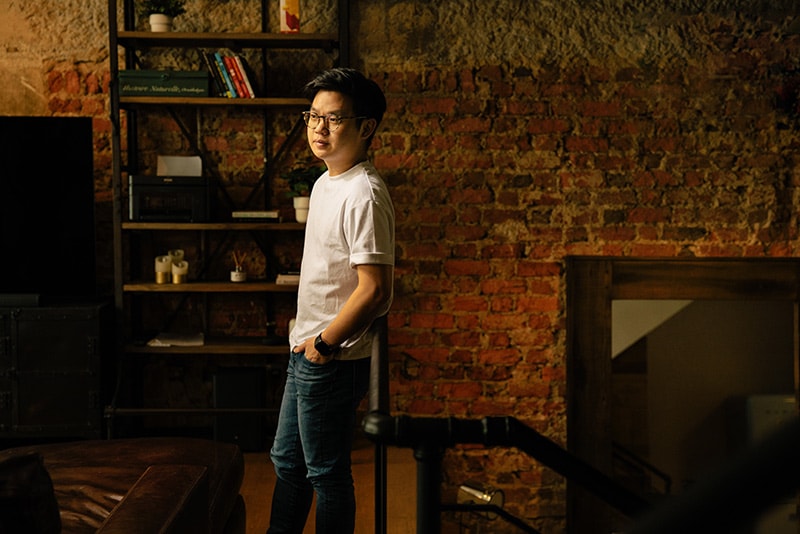
"I went into a high-pressure school, higher than the national standard. Internally and externally, it makes one more susceptible to their own anxiety."
DAWN: As someone who struggled with anxiety in secondary school, do you think the issue lies in our education system?
THEODORIC: There are many merits to our education system. However, one of the consequential things is the high-pressure environment. Speak to any parent and you will know that they want their kid to succeed very early on in life. It’s not wrong to strive, but we need to take a step back and see what balance needs to be struck. Childhood cannot be neglected. I went into a high-pressure school, higher than the national standard. Internally and externally, it makes one more susceptible to their own anxiety. We should be focusing more on life skills, like how to deal with people, and have a more holistic education. Purely going through an academic path and having a sheltered life will not help our children.
DAWN: To this day, is there anything that still makes you anxious? If so, what are some self-soothing techniques you use to calm yourself down?
THEODORIC: I still have my panic attacks. I am anxious about crossing a junction and constantly worry about my loved ones. However, there are multiple techniques that I’ve learnt from therapists: soothing sessions, not being too caught up in the moment, the worrying tree, CBT-based activities, breathing and mindfulness.
DAWN: You’re clearly one of those people who did not need to go to university to be successful.
THEODORIC: It was risky then and I was worried about my parents. But I had a clear sense of the skillsets I wanted to build in the long run. Being exposed more quickly to the world outside education showed me that it all boils down to execution. I felt like I was fast-tracking the processes of life post-college.
DAWN: As a young leader, what are some tough decisions you have had to make during the pandemic?
THEODORIC: One of the hardest things for me was hiring people that have had more experience than me! The tough decisions I’ve made have always revolved around people. Once, we had to let go of an employee that didn't fit well with our culture and it was painful because I liked him as a person. I struggle to draw that line. But I think the pandemic has actually helped the business grow, given all the increasing interest in mental health.
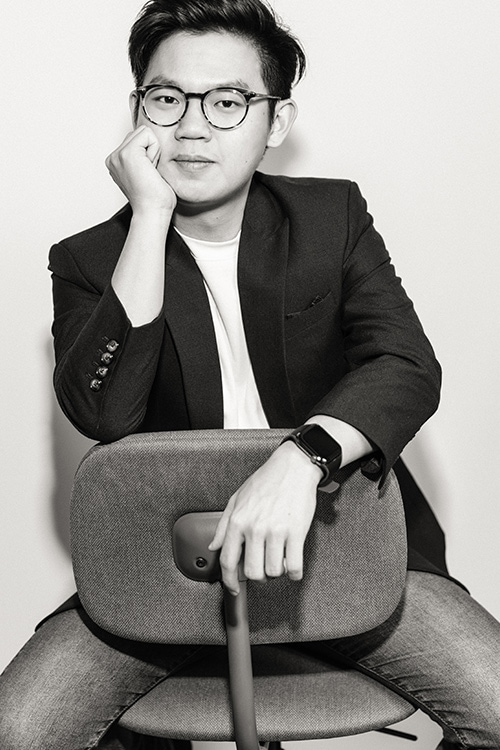
DAWN: What was your initial motivation for starting Intellect? And has the company’s direction changed over the years?
THEODORIC: In the early days, it was about solving a personal problem. I went through therapy myself and it was expensive, so that was the initial catalyst. It was a smaller version of what we are currently doing, then it grew progressively. We started thinking about how we could scale. In the initial days, we launched a self-care app, which included bite-sized digital sessions on the go. It was more lightweight and we couldn’t claim to support severe clinical needs. Now, we can—our app is more immersive and we even have trained psychiatrists to meet different needs.
"In Asia, people struggle, but they don’t know where to get started. They need support but don’t want to acknowledge it."
DAWN: You mentioned that you noticed gaps in mental healthcare regionally and globally previously in an interview. What were some of the things that stood out particularly for you?
THEODORIC: Asia has some of the highest mental health and crisis rates. However, fewer people seek help here as compared to the US, where people actively see therapists and are not scared of the stigma. In Asia, people struggle, but they don’t know where to get started. They need support but don’t want to acknowledge it. The biggest difference is our public awareness and our fundamental understanding of mental health. The question is how can we then shift the narrative of mental health?
DAWN: Your app also connects employees to a panel of licensed coaches and clinical therapists within minutes. How do you ensure that the employees are best matched to a coach who can suit their needs?
THEODORIC: Yes, it is a solid system. We have people to match our clients with suitable professionals to help them with their needs. Unlike a purely guided AI session, a living person could develop a relationship and journey with the individual. If people are in high distress, we will have our own in-house clinical team that designs a structured framework to assess risks. In short, we have clinical professionals that bring in systems proven to work.
DAWN: What would you say to people who question your goal of creating a more accessible and affordable end-to-end mental healthcare system with an app like yours?
THEODORIC: If you compare a digital platform to in-person therapy, I would say that the latter has more efficacy, but the drawback is it is not scalable. We are making something scalable. It might not be as “pure” as traditional face-to-face therapy sessions, but we are getting there. Based on our clinical studies, we know that our programmes are effective.
DAWN: Early in the year, Intellect raised US$10 million in a Series A round led by New York-based HOF Capital. How are you intending to use the funds?
THEODORIC: To expand our product innovation teams and see how we can work with individuals in day-to-day living. Currently, our app is available in 15 languages and we have counsellors in over 20 countries. We intend to scale across Asia, like Hong Kong to support the market there.
DAWN: How did you manage to persuade the likes of ShopBack’s co-founder Henry Chan and Tinder and Match Group’s general manager Gaurav Girotra to part with their money?
THEODORIC: These investors see the potential of technology. They believe in what we do and see that we can make a positive change in the world. Find people who are aligned with you, in terms of what you are trying to build. Additionally, we had the numbers to show investors we were on the right track. This makes people confident to invest in us.
DAWN: There has been a renewed focus on mental health globally in the past few years. Why do you think this is the case?
THEODORIC: When we started Intellect in 2019, I knew it was just a matter of time before mental health would become mainstream. Everyone has struggles in different parts of life. When we were forced to change the way we had to live because of Covid-19, that made the mental struggles more intense. Everyone quickly realised that mental issues needed to be addressed. The main mode in the past was face-to-face therapy, but in this current age, people need to adapt. Our audience wants something more private and discreet, so we are trying to build that. It’s constantly evolving, growing and adapting for the individual.
DAWN: With start-ups in the mental healthcare sector raising $1 billion in the first quarter of 2022, how does Intellect differentiate itself from companies like BetterUp?
THEODORIC: Our focus is mainly on the APAC region. There are many big players in the US, but there is nothing full-fledged in Asia. That is the key reason why we are building it here. This is a space that is quickly growing with many new players coming up. Our mission is to build an entire mental healthcare system, not just separate pillars. We are an end-to-end platform: whether you wake up feeling lousy, or are dealing with a full-blown crisis. Many apps are fragmented and don't connect you to the next step, but we have the most immersive form of support. We are truly trying to change the perception towards mental care and not just having the infrastructure in place. That’s how we are going to reinvent the mental healthcare system.
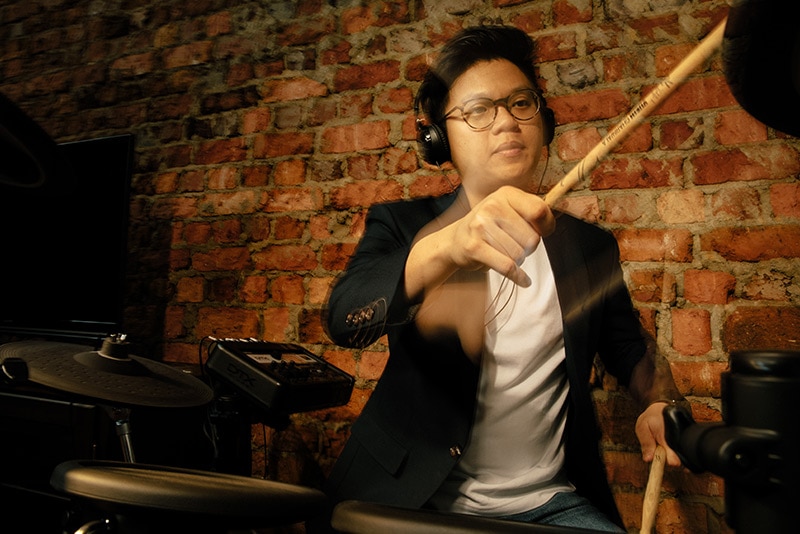
DAWN: Sean Rad, co-founder of Tinder, once said: “When you are building a startup, it’s difficult. You have to give 100 per cent, and you have to be committed.” What sacrifices did you have to make in your journey so far?
THEODORIC: There are many stressful moments not featured in the media. At Intellect, we believe a lot in work-life balance; we try to keep work within working time. I do have my own time to unplug with my own therapist and I have a coach to help me to regulate my lifestyle too. Unfortunately, you would have less of a social life. That’s the trade-off. However, I don't have any regrets because I got to work with many great people and meet experts in the field.
DAWN: Lastly, are there any good self-help books that you would recommend to people?
THEODORIC: Awaken the Giant Within by Tony Robbins. He incorporates several psychological principles into the book and also focuses on the different aspects of a person’s life—not just the mind. One of his techniques that stands out is cognitive behavioural therapy. He explains how to break the negative beliefs of people. Don’t keep thinking that a negative belief is true. Think of the times you have worked hard, and use it to contradict those false beliefs. This will help you rebuild a part of yourself.

